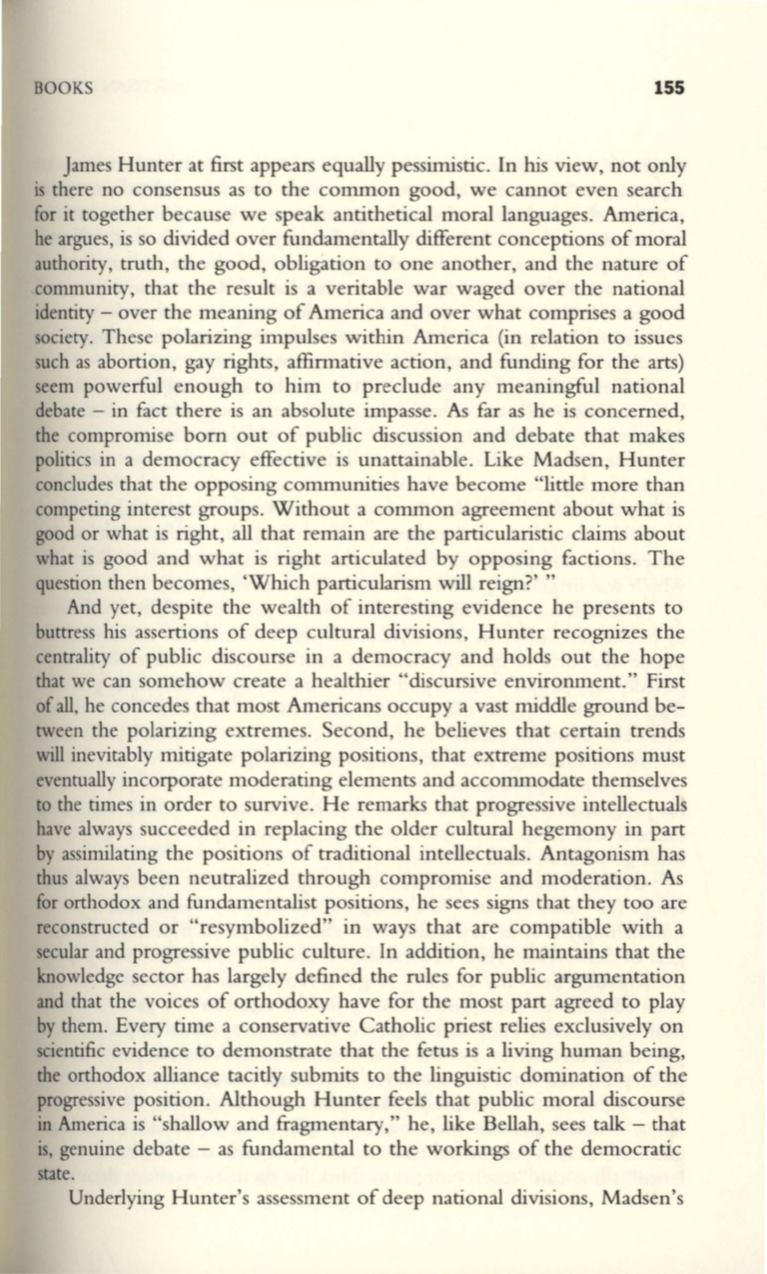
BOOKS
155
James Hunter at first appears equally pessimistic. In his view, not only
is there no consensus as to the common good, we cannot even search
for it together because we speak antithetical moral languages. America,
he argues, is so divided over fundamentally different conceptions of moral
authority, truth, the good, obligation to one another, and the nature of
community, that the result is a veritable war waged over the national
identity - over the meaning of America and over what comprises a good
society. These polarizing impulses within America (in relation to issues
such as abortion, gay rights, affirmative action, and funding for the arts)
seem powerful enough to him to preclude any meaningful national
debate - in fact there is an absolute impasse. As far as he is concerned,
the compromise born out of public discussion and debate that makes
politics in a democracy effective is unattainable. Like Madsen, Hunter
concludes that the opposing communities have become "little more than
competing interest groups. Without a common agreement about what is
good or what is right, all that remain are the particularistic claims about
what is good and what is right articulated by opposing factions. The
question then becomes, 'Which particularism will reign?' "
And yet, despite the wealth of interesting evidence he presents to
buttress his assertions of deep cultural divisions, Hunter recognizes the
centrality of public discourse in a democracy and holds out the hope
that we can somehow create a healthier "discursive environment." First
of all, he concedes that most Americans occupy a vast middle ground be–
tween the polarizing extremes. Second, he believes that certain trends
will inevitably mitigate polarizing positions, that extreme positions must
eventually incorporate moderating elements and accommodate themselves
to the times in order to survive. He remarks that progressive intellectuals
have always succeeded in replacing the older cultural hegemony in part
by assimilating the positions of traditional intellectuals. Antagonism has
thus always been neutralized through compromise and moderation. As
for orthodox and fundamentalist positions, he sees signs that they too are
reconstructed or "resymbolized" in ways that are compatible with a
secular and progressive public culture. In addition, he maintains that the
knowledge sector has largely defined the rules for public argumentation
and that the voices of orthodoxy have for the most part agreed to play
by
them. Every time a conservative Catholic priest relies exclusively on
scientific evidence to demonstrate that the fetus is a living human being,
the orthodox alliance tacitly submits to the linguistic domination of the
progressive position. Although Hunter feels that public moral discourse
in America is "shallow and fragmentary," he, like Bellah, sees talk - that
is,
genuine debate - as fundamental to the workings of the democratic
state.
Underlying Hunter's assessment of deep national divisions, Madsen's


